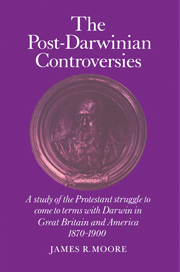 The Post-Darwinian Controversies
The Post-Darwinian Controversies Published online by Cambridge University Press: 22 January 2010
When one discusses Darwinism, to what does one refer? Is it a theoretical Darwinism, … what Neo-Darwinism retained or adapted from Darwin? Or is it the historical Darwinism, with its doubts, its retractions, its concessions to critics, from the first edition of the Origin of Species to the ‘Essay on Instinct’? … [Would it not be] simpler to start with Darwin himself and what he wrote than with an imaginary Darwinism whose existence in the realm of ideas creates unnecessary difficulties?
Jacques RogerThe works of Charles Darwin (1809–1882) have been cited more frequently than read, and read far more often than understood. Religious reactionaries and the sycophants of scientism have alike forced Darwin to serve their dubious ends, while even persons of moderation have represented as Darwinism either more or less than the primary texts allow. Under these circumstances, which have only lately begun to change, a just understanding of Darwin's theory of evolution by natural selection must be founded on Darwin's statement of it. Fortunately, there is at least one passage in the Origin of Species that remained substantially unaltered throughout the book's six editions (1859–72), which distils the essence of Darwinism into less than five hundred words.
To save this book to your Kindle, first ensure [email protected] is added to your Approved Personal Document E-mail List under your Personal Document Settings on the Manage Your Content and Devices page of your Amazon account. Then enter the ‘name’ part of your Kindle email address below. Find out more about saving to your Kindle.
Note you can select to save to either the @free.kindle.com or @kindle.com variations. ‘@free.kindle.com’ emails are free but can only be saved to your device when it is connected to wi-fi. ‘@kindle.com’ emails can be delivered even when you are not connected to wi-fi, but note that service fees apply.
Find out more about the Kindle Personal Document Service.
To save content items to your account, please confirm that you agree to abide by our usage policies. If this is the first time you use this feature, you will be asked to authorise Cambridge Core to connect with your account. Find out more about saving content to Dropbox.
To save content items to your account, please confirm that you agree to abide by our usage policies. If this is the first time you use this feature, you will be asked to authorise Cambridge Core to connect with your account. Find out more about saving content to Google Drive.